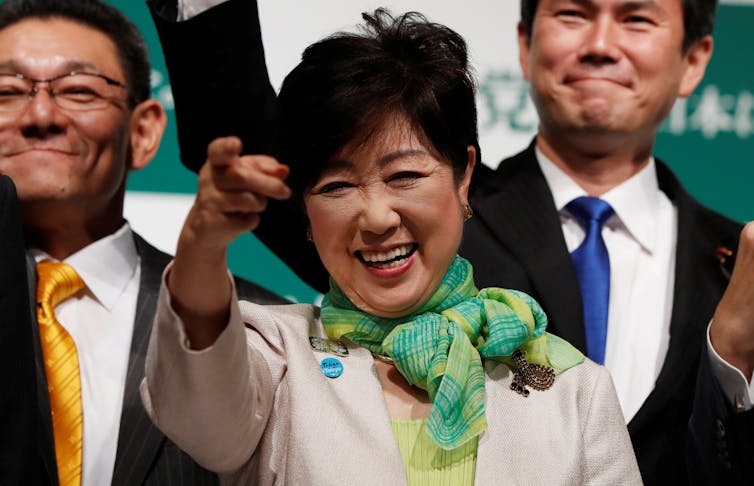Shinzo Abe gambles on sending Japan to a snap election – but it may yet backfire
- Written by Nick Bisley, Executive Director of La Trobe Asia and Professor of International Relations, La Trobe University
Japanese Prime Minister Shinzo Abe dissolved the lower house of the national parliament, the Diet, on September 28, with an election to be held on October 22. Called more than 12 months earlier than needed, the snap poll was a calculated gamble by the leader of the conservative LDP to strengthen his hand.
But within days of making the decision, what had seemed like an easy win for the veteran leader looked like a much riskier proposition. Not only might Abe fail to get the national mandate he needs to take on some risky reforms, he may well end up being fatally weakened by a new populist force led by the charismatic governor of Tokyo, Yoriko Koike.
Since being returned as prime minister in 2012, Abe has become the dominant politician of his generation. In going to the electorate early, he is seeking support for his desire to throw off the constitutional constraints on Japan’s military. If he were to succeed, he would become the most significant political figure in the country’s post-war history.
The long-held ambition to allow Japan to play a military role in line with its economic scale was a key reason for going to the voters.
Even though Abe has been highly successful in national elections, he has recently been plagued by a number of scandals relating to favours he is alleged to have given to several conservative school operators. Abe’s return from the political wilderness was made possible because of the promise he made to reform and re-energise Japan’s sclerotic economy.
Yet after half a decade in power, he has failed to deliver on much-needed structural changes in the economy. From liberalising trade restrictions to improving female participation in the workforce – Japan has amongst the lowest in the OECD – much was expected from Abe. But he has largely failed to deliver.
Scandal, plus underwhelming economic reform, has seen his opinion polls plunge to what some commentators described as entering the “death zone” in July.
In August he reshuffled his cabinet to try to cauterise the effects of the school scandals. With North Korea’s provocative behaviour playing into his hands as a security hawk, he sensed a moment to break the momentum of negative polling. Going to the electorate is an effort to put the problems definitively behind him.
Finally, in what is perhaps the most opportunistic of his motives, Abe is aiming to capitalise on disarray in the opposition. The Democratic Party suffers from internal division, weak leadership and a lack of clarity about what it stands for. Sensing that even disillusioned voters had nowhere else to turn, Abe felt that now was the moment to strike.
 The charismatic Tokyo governor Yoriko Koike, leader of the new Party of Hope, is threatening the long reign of Shinzo Abe.
Reuters/Issei Kato
The charismatic Tokyo governor Yoriko Koike, leader of the new Party of Hope, is threatening the long reign of Shinzo Abe.
Reuters/Issei Kato
But as 2016 should have reminded him, politics retains its capacity to surprise. Within hours of signalling his intent to go to the polls early, Koike entered the fray. Realising that voters were genuinely dissatisfied both with Abe’s LDP and the opposition, she swiftly established a new political party.
As each day has gone by, she has struck deals with minor parties, prefectural governors and even the Democratic Party to coordinate policies and candidates to forge a national anti-Abe coalition.
Koike’s new party, Kibo no To (Party of Hope), is a conservative populist movement that reflects the anti-establishment zeitgeist of advanced industrial democracies. Kibo no To sits outside the party mainstream and presents itself as a new force capable to making real change to a stagnant political system.
Centred around Koike, a former journalist, LDP defence minister and incumbent governor of Tokyo, the new party wants to remake Japanese politics by decentralising power, advancing security reform, eliminating nuclear power and increasing female empowerment.
The sudden creation of the new party, the speed with which it has gathered supporters and its leader’s talent with the media, have caught Abe and the LDP flat-footed. With a more credible opposition, there is now a risk voters will punish the party that approaches the electorate too cynically.
This sense has been underlined by ongoing tensions in the Korean Peninsula, the management of which many argue should be a higher priority for Abe than trying to take advantage of a weakened opposition.
While the election campaign is compressed, the outcome on October 22 is far from certain. Abe suddenly seems less impressive and the new political force is surging. But the broad coalition that Koike is trying to create may prove illusory.
North Korea’s behaviour could coax voters back to Abe, and the LDP’s impressive electoral machine has a strong chance of delivering the mandate he seeks. But this would be the exception to the pattern industrial democracies, where outsiders promising change have bested establishment figures. Abe, the grandson of a prime minister and among the country’s longest-serving leaders is nothing if not establishment.
Whatever happens, given that the vote occurs halfway through China’s 19th national party congress, October will be a fascinating month in Northeast Asia’s complex political landscape. Much will turn on the outcomes of both electoral jamborees.
Authors: Nick Bisley, Executive Director of La Trobe Asia and Professor of International Relations, La Trobe University





